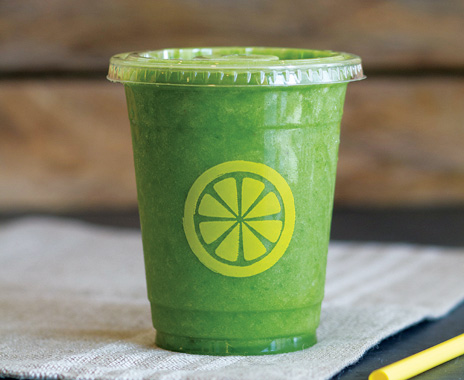It’s a fact any restaurant, convenience store, food hall, and beverage supplier has heard on repeat the past decade: Soda sales and consumption are trending downward. They hit their lowest level in 30 years in 2015, which also marked the 11th consecutive year that sales have declined, according to beverage industry tracker Beverage Digest.
But things aren’t all gloom and doom for the beverage business. In fact, as consumers are turning to healthier everything—drinks included—some beverage categories are seeing a rise in popularity, including smoothies, juices, teas, and cocktails. Likewise, more brands than ever are jumping into the better-for-you beverage business, with true innovation coming from niche brands rather than mass-market concepts, says Dennis Lombardi, president of restaurant advisory firm Insight Dynamics.
Lombardi says Boomers, Millennials, and members of Gen Z are driving the rapidly increasing demand for fresher, lower-sugar, lower-calorie, “enhanced” beverages that not only taste delicious, but also provide a truly healthful addition to their diets.
“[Millennials] are a more educated consumer, and they recognize the difference between a nutritionally compromised product or beverage,” says Mitchell Baker, vice president and chief brand officer for Los Angeles–based sister brands DRNK Coffee + Tea and Qwench Juice Bar. “There’s a lot more offerings out there because brands are getting smarter; they’re realizing the consumer is changing, the consumer taste is changing.”
With a focus on organic and Fair Trade–certified coffees and teas, DRNK has developed healthier offerings like the Chai Tea Latte and Chai Blanc, made with organic masala chai.
Connecticut-based Green & Tonic is innovating in the tea space around matcha and functional, medicinal teas, as well as in the coffee space with nitrogen-flushed, cold-brewed coffee combined with homemade almond milk for shaken drinks. “Our customers love to have an afternoon iced coffee, and we’re just replacing that with something that’s healthy,” says owner Jeffrey Pandolfino.
The brand recently introduced a Turmeric Latte—featuring fresh turmeric root for anti-inflammatory and immune-boosting qualities—as well as a Matcha Tea Latte made with almond milk and local honey to combat seasonal allergies. Pandolfino says consumers also crave its Fire Cider, an apple cider vinegar–based shot purported to repair gut bacteria levels and boost the immune system.
When it comes to juices and smoothies, both customers and restaurants are moving away from products that use sherbets, ice creams, and powdered supplements as a base, Baker says. “Consumers are just getting smarter and realizing that those are not as healthy for them as they’re positioned to be.”
That’s why Qwench uses Greek yogurt and fresh fruits as smoothie and juice foundations, while it also adds superfoods to act as nutritional supplements. “We’ve created a number of recipes that are sweetened, instead of with cane sugars, with agave or honey,” Baker says. “We really try to focus on products that are enhanced with natural ingredients and natural properties in them instead of the artificial.”
Kombucha is another product that consumers are growing increasingly interested in. This centuries-old but now trending drink is a fermented, slightly effervescent, sweetened green or black tea featuring live cultures, which act as probiotics to aid digestion. Though the scientific jury is still out on its proven effects, many drinkers believe it detoxifies, relieves joint pain, and boosts the immune system.
“For the first-time user, kombucha sounds like a foreign language,” Pandolfino says. “But when they try it, nine times out of 10, most people really like it. They’re surprised by how good it tastes, and they’re surprised about the energy they get from it.”
This summer, Philadelphia-based fast casual Farmer’s Keep will introduce a kombucha bar featuring kombucha on tap and a variety of liquor and mixers for create-your-own kombucha drinks.
“Rather than getting a vodka and Sprite, they’ll get a vodka kombucha,” says owner Joshua Bullock. “The flavor profiles are nice, and you’re also giving them something healthy while they’re participating in something not as healthy.”
The health-focused restaurant isn’t the only concept adding better-for-you cocktails to its menu. Each month, New York vegan eatery By CHLOE introduces a new specialty cocktail with a healthy twist—from a Wheatgrass Martini to a Grapefruit Mojito—giving guests the option to indulge without as much of the guilt.
Denver’s Honor Society offers a number of health-conscious cocktails, too. The Hummingbird Cocktail is a white wine spritzer made with elderflower, an anti-inflammatory known for helping with joint pain and arthritis, says Seth Rhodes, head of Honor Society’s beverage program. Another bestseller is the Millennial Sour made with bourbon, which Rhodes calls one of the most healthful liquors. The drink also features a ginger-heavy simple syrup to aid digestion, as well as kombucha for effervescence.
“It’s fun to come up with unique combinations utilizing these fresh ingredients to get people excited and not feel like it’s a burden to drink a drink with kale and spinach pressed into it,” Bullock says of crafting healthier cocktails. “On the surface that might not sound like the greatest thing, but when you mix it with some interesting stuff, it can provide a lot of flavor and a lot of nutrients.”













